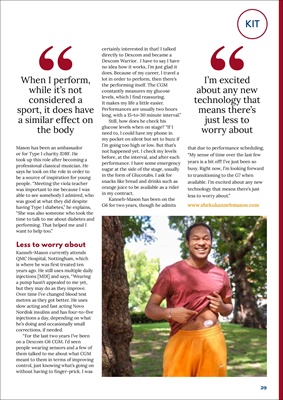
29
KIT
When I perform,
while it's not
considered a
sport, it does have
a similar effect on
the body
Mason has been an ambassador
or for Type 1 charity JDRF. He
took up this role after becoming a
professional classical musician. He
says he took on the role in order to
be a source of inspiration for young
people. "Meeting the viola teacher
was important to me because I was
able to see somebody I admired, who
was good at what they did despite
having Type I diabetes," he explains,
"She was also someone who took the
time to talk to me about diabetes and
performing. That helped me and I
want to help too."
Less to worry about
Kanneh-Mason currently attends
QMC Hospital, Nottingham, which
is where he was first treated ten
years ago. He still uses multiple daily
injections [MDI] and says, "Wearing
a pump hasn't appealed to me yet,
but they may do as they improve.
Over time I've changed blood test
metres as they got better. He uses
slow acting and fast acting Novo
Nordisk insulins and has four-to-five
injections a day, depending on what
he's doing and occasionally small
corrections, if needed.
"For the last two years I've been
on a Dexcom G6 CGM. I'd seen
people wearing sensors and a few of
them talked to me about what CGM
meant to them in terms of improving
control, just knowing what's going on
without having to finger-prick. I was
certainly interested in that! I talked
directly to Dexcom and became a
Dexcom Warrior. I have to say I have
no idea how it works, I'm just glad it
does. Because of my career, I travel a
lot in order to perform, then there's
the performing itself. The CGM
constantly measures my glucose
levels, which I find reassuring.
It makes my life a little easier.
Performances are usually two hours
long, with a 15-to-30 minute interval."
Still, how does he check his
glucose levels when on stage? "If I
need to, I could have my phone in
my pocket on silent but set to buzz if
I'm going too high or low. But that's
not happened yet. I check my levels
before, at the interval, and after each
performance. I have some emergency
sugar at the side of the stage, usually
in the form of Glucotabs. I ask for
snacks like bread and drinks such as
orange juice to be available as a rider
in my contract.
Kanneh-Mason has been on the
G6 for two years, though he admits
that due to performance scheduling,
"My sense of time over the last few
years is a bit off! I've just been so
busy. Right now, I'm looking forward
to transitioning to the G7 when
available. I'm excited about any new
technology that means there's just
less to worry about."
www.shekukannehmason.com
I'm excited
about any new
technology that
means there's
just less to
worry about